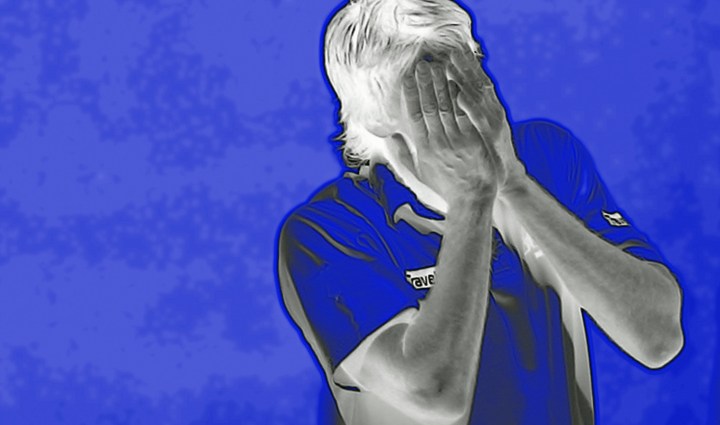Sport
Cricket and depression – the dark alchemy

The two have been married to each other for quite some time now. While there is no way to prevent it, it’s becoming increasingly vital to stop the disease from escalating and ultimately leading to players’ grim fate, writes ANT SIMS.
On Sunday a cricketer from Tamil Nadu was found hanging in his house. Police suspect a case of suicide and, while there is absolutely no evidence that his actions were directly or indirectly related to his cricketing career, it did send shockwaves through the cricketing community – again.
PK Dharma, a mechanical engineering student at a city college, was just 20 years old and touted as a feisty player, one with promise for the future. He was not the first and will most likely not be the last cricketer whose life was cut short so abruptly, but his death needs to be considered in a sport (and a society) desperate for intervention and the abolishment of the stigma surrounding depression.
Depressed cricketers are nothing new. In a book written by David Firth, Silence of the Heart: Cricket Suicides, about 100 accounts of cricketers committing suicide is explored and analysed. Though some of the cases are only loosely connected to the game and its players, it still raises the question: are cricketers more prone to depression and, ultimately, the grim fate of suicide?
On average, one in six men will suffer from depression at one stage in their life. At least 15% of elite athletes have to fight demons and stigmas attached to a mental illness that often gets cast aside as something which can be cured by simply “toughening up”. Yet, if the numbers are taken into account, it would suggest that at least one or two players in any squad suffer from depression. In American baseball, the depression rate was found to be two and a half times higher than that of the average population. It makes for chilling reading and, if the statistics are to be believed, the evidence is damning that cricket is a catalyst for depression. Why?
“I think the reason we see so many cricketers suffer from it is the time involved in playing cricket. It’s a game that’s played over a long period of time,” Proteas team manager Dr Mohammed Moosajee told the Daily Maverick.
“There are long periods away from home, there’s a lot of idle time between games and during games, especially in Tests. Some players might spend a day or two days in the dressing room because they’re a bowler and the team is out there batting,” he said.
It’s true, of course. Players can, during a jam-packed year, spend anything from four to seven months away from home and on the road. If those players are involved in other tournaments like the Indian Premier League, the Big Bash League, county cricket in England or any other form of non-international cricket, the period becomes even longer.
The life of an international sports star seems glamorous in its essence, but with the fame, fortune and the fancy hotels comes a dark side of life which often gets swept under the rug. The pressure of needing to perform to stay in the team, the expectations of fans, the media’s constant autopsies and being measured by your averages all make for a volatile combination that, if left to simmer, could plunge players into the deep end of a dark and dangerous illness.
“There have been some international names that have come out and admitted to their depression. Guys like Steve Harmison, Marcus Trescothick, Michael Yardy, Iain O’Brien and Shaun Tait. They’ve all admitted to suffer from depression and admitted to it. It’s a good thing,” Moosajee said.
O’Brien, who has been an advocate for depression awareness, admits speaking out is a good thing and the way forward, but he’s concerned people will start thinking depressed cricketers are a bit of a cliché.
“It’s gotten to a point where cricketers, especially, are coming out and saying they are depressed and people start thinking ‘oh no, here we go again’,” O’Brien told the Daily Maverick.
“We need to be careful about not getting that way about it, because it is a serious illness. But people have to keep on speaking out, because as soon as it starts to become a more easily understood illness, we’ll be in a better place.
“I am concerned that we’ll eventually end up with people thinking ‘oh, another sportsman suffering from depression: they live a great life’. Yeah, we do live great lives, but depression doesn’t pick you based on your lifestyle. And we need to just take some care in how it’s talked about when people speak up about suffering from depression,” says the 35-year old.
O’Brien, who played 22 Tests for New Zealand before retiring, says he spoke out because he heard other people speak out and, in turn, hoped for the domino effect to continue.
“Other people motivated me to go get help and I hope that my speaking out would lead to other people getting some help. And I do know of at least four other people who have told me that because of my speaking out, they went to get some help,” O’Brien says.
“I think we all suffer from sort of depression at some stage, but it’s the how long, how deep and how often you suffer from it that determines what sort of depression you have. I do think that most cricketers suffer from a depressive bout at some stage.
“The tragedy of cricket is that you are always thinking about your next failure instead of your next success. It’s always easier to see the failures and those people who overcome that sort of thinking usually have success in cricket. The rest of us struggle and we need to talk about it,” says O’Brien.
Moosajee says “Through education and talking about it, people are more and more realising that depression is not just a mental condition. It’s an illness and it’s classified as a chronic condition, just like hypertension, asthma and heart disease would be classified. I think this kind of classification has made it a bit easier for people to come out and seek help and make others aware of it too.”
“It’s important for coaches and everybody involved in the team set-ups to look after their players and monitor them and, if they spot any symptoms, they need to make sure there are structures in place to help these players in whatever way, be it having a psychologist, a therapist, a counsellor, anything at hand to help them get better.”
O’Brien agrees, but urges more proactive steps are taken in order to make players and those surrounding players aware of the symptoms. He suggests simple steps like signage around change rooms, dressing rooms and lunch rooms, listing the symptoms and the people to contact if any of the symptoms tick a box.
Depression, in some cultures, is still cast aside as something taboo, foreign and something which doesn’t belong, but Moosajee believes the more it is talked about, the more stereotypes can be broken down.
“We need to keep talking about it and discussing it and getting rid of the stigma. And it’s important for people to remember that underneath the sportsman and the superstar there is still a human being and, just because they are on the global stage, doesn’t mean they are exempt from the struggles we all face on a daily basis.”
Moosajee says South African cricketers have it good. Most of the franchises in the country have help at hand, whether it’s in the form of a clinical psychologist or sports psychologist. Everyone in all the set-ups keeps an eye out for any symptoms to ensure that, across the board, if somebody looks like they might be struggling, they get some help.
While it’s good news for South African players, there are undoubtedly countries where players are not so fortunate.
“I think it’s up to the players’ associations to lead this one,” says O’Brien. “They look after players’ welfare and that’s their main role. They need to have a bigger input and be more proactive in terms of letting players know about the symptoms and about getting help.”
“I know in New Zealand, if you put your hand up, you get help. In England if you put your hand up, you get help. A lot of people don’t know that the help is there, though, and that’s something I have a little bit of an issue with. Players also don’t know that most of the time the players’ associations will pay for the help. It can be an expensive illness, so players need to be made aware of what kind of help is available to them.”
Cricket will always be married to depression. For that, there is no solution. To prevent the marriage evolving into an abusive, destructive relationship which ultimately leads players to their death is the real challenge. To do that, we need to get rid of the stigma that surrounds it. DM
Photo: Reuters


















 Become an Insider
Become an Insider